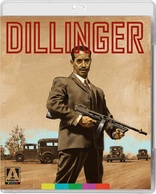Dillinger Blu-ray Movie
HomeDillinger Blu-ray Movie 
Blu-ray + DVDArrow | 1973 | 107 min | Rated R | Apr 26, 2016
Movie rating
7.3 | / 10 |
Blu-ray rating
| Users | 3.4 | |
| Reviewer | 3.5 | |
| Overall | 3.4 |
Overview
Dillinger (1973)
True-life story of gangster John Dillinger. His violent life of crime made headline news in the thirties, an he robbed banks across the mid-west. A folk hero of sorts, Dillinger was caught in a whirl of machine guns, fast cars and beautiful women. But it came to a bloody end in 1934 when the FBI gunned him down.
Starring: Warren Oates, Ben Johnson, Michelle Phillips, Cloris Leachman, Harry Dean StantonDirector: John Milius
| Crime | Uncertain |
| Biography | Uncertain |
| Action | Uncertain |
Specifications
Video
Video codec: MPEG-4 AVC
Video resolution: 1080p
Aspect ratio: 1.85:1
Original aspect ratio: 1.85:1
Audio
English: LPCM Mono (48kHz, 24-bit)
Music: LPCM Mono
Subtitles
English SDH
Discs
50GB Blu-ray Disc
Two-disc set (1 BD, 1 DVD)
DVD copy
Playback
Region A (locked)
Review
Rating summary
| Movie | 3.5 | |
| Video | 3.5 | |
| Audio | 4.0 | |
| Extras | 2.5 | |
| Overall | 3.5 |
Dillinger Blu-ray Movie Review
Public Enemy No. 1 with a bullet.
Reviewed by Jeffrey Kauffman May 5, 2016It’s since long faded in our national consciousness, but the reaction of many folks to Arthur Penn’s iconic 1967 film Bonnie and Clyde was far from positive. While the film was almost incredibly popular and received largely (if not uniformly) rapturously positive remarks from the critics, there was a rather large swath of folks who decried the film’s so-called “glorification of violence”. As a salient if tangential example of this phenomenon, I remember to this day standing in a Seattle sheet music store as a little boy begging my mother to buy me a Bonnie and Clyde song folio featuring Charles Strouse’s weirdly ebullient music, music which was all the rage then and receiving considerable airplay. She resolutely refused, telling me she wasn’t giving “one red cent” to some perceived monolith who would be profiting from exposing American youth to such unsavory characters. There’s no denying that Bonnie and Clyde completely reshaped how film treated “gangsters”, making the legendary pair the “heroes” (not even typical anti-heroes as were already beginning to populate 1960s films). It was a topsy turvy approach and one that helped to define the film for the “youth movement”, which was all about upsetting the established social order. Things were quite a bit different by 1973 when John Milius’ first directing effort Dillinger was released, but there’s still the hint of Arthur Penn wafting through the film, albeit in a somewhat diluted form. There's a probably more overt Sam Peckinpah ambience suffusing Dillinger, though, one that is made overt due to the casting of Peckinpah regulars Warren Oates and Ben Johnson, if not the often graphic violence that's on display. Made on a typically paltry American International budget, Dillinger’s reach may well exceed its grasp, and its relationship to the “actual facts” is stretched about as thin as Bonnie and Clyde’s was, but the film offers a commanding performance by Warren Oates and also conjures up a rather evocative ambience of Depression Era America that is quite memorable.
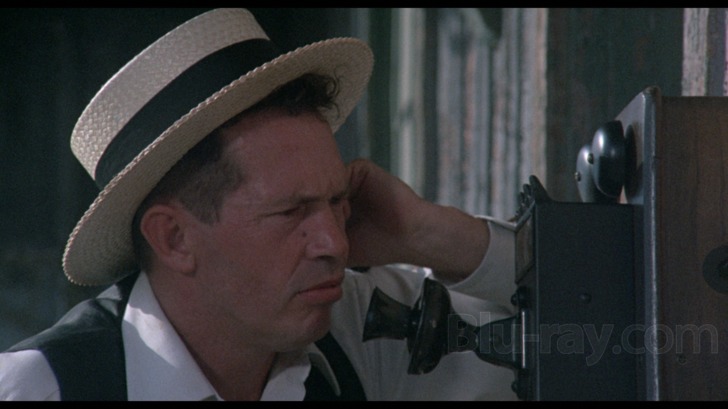
As Stephen Prince mentions in his often quite interesting commentary, Dillinger very well could have been titled Purvis, given its emphasis (including narration by the character) on the famed FBI agent (played in the film by Ben Johnson) who made capturing Dillinger a bit of an obsessive quest. There’s an interesting subtext in the film where Dillinger’s increasing fame and almost mythological status among everyday people (in an element that frankly recalls Bonnie and Clyde) kind of got under Purvis’ skin, since he was obviously not loathe to court fame himself. That sets up an unusual dialectic where Purvis’ aims aren’t particularly noble in the traditional sense, but may in fact be more motivated in a sort of “Kanye keeping Taylor off the winner’s stage” sort of way (to put it in a modern vernacular).
Dillinger plays almost laughably fast and loose with the facts, reordering events and inventing shootouts where there were none (or at least not to the degree depicted), all of which makes the film play a bit more whimsically (as odd as that may sound) than typically gritty “ripped from the headlines” criminal fare. In fact, Milius’ screenplay is often archly comic, giving various bad guys one liners and some odd little moments where Dillinger’s version of the American Dream is simply to be a bank robber. The romantic angle with Billie Frechette (Michelle Phillips in her acting debut) is also handled a bit haphazardly, and seems to be cut willfully from the Bonnie and Clyde cloth.
Still, Milius is able to create a largely believable context for the larger than life characters, ably crafting a dusty, at times almost John Fordian, environment which makes the haggard lives of many folks in the early thirties almost palpable. The film also benefits from a glut of colorful supporting performances, including Henry Dean Stanton as Homer Van Meter and Richard Dreyfuss as Baby Face Nelson. Cloris Leachman has what amounts to a glorified cameo as a woman who helps bring Dillinger to justice. Milius indulges in some Peckinpah-esque violence, albeit without the slow motion grandeur Peckinpah tended to prefer. It’s a different kind of “glorification of violence”, one which in fact is less glorified than horrifying.
Dillinger Blu-ray Movie, Video Quality 
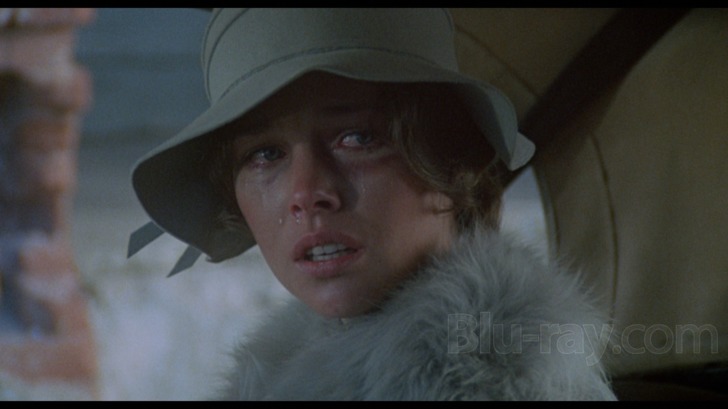
Dillinger is presented on Blu-ray courtesy of Arrow Films with an AVC encoded 1080p transfer in 1.85:1. The insert booklet included with this release contains the following information on the provenance of the source elements and transfer process:
Dillinger has been exclusively restored in 2K resolution for this release by Arrow Films and is presented in its original theatrical aspect ratio of 1.85:1 with mono sound.With an understanding that Dillinger was shot on the fly (Milius is on record talking about almost funny situations like not having enough track to do "real" tracking shots), this new restoration looks very good, albeit with some issues that ardent videophiles will notice. The restorative efforts have certainly delivered a largely damage free viewing experience, with very little in the way of dirt or other distractions dotting the frame. While density has evidently been improved (according to the above information), there are still noticeable variations throughout the presentation, along with attendant fluctuations in brightness and contrast. This gives the overall appearance of this transfer a somewhat heterogeneous look in terms of palette stability, with many long swaths looking decently vivid and warm, but other moments appearing at least slightly washed out and lackluster. Detail can be quite commendable in brightly lit scenes that do not suffer from density, brightness or contrast issues (see screenshot 10). Quite a bit of the transfer is on the soft side, something that the variable brightness and contrast tend to emphasize. Grain is healthy, but encounters a few resolution stumbling blocks as can be spotted in several of the screenshots accompanying this review. The bottom line is this is a healthy and organic looking transfer that is no doubt the best Dillinger has looked on home video (I admittedly never saw the film theatrically), but which still has a few issues that the current restoration wasn't able to completely ameliorate.
The original 35mm interpositive was scanned in 2K resolution on a pin registered 4K Northlight scanner and picture grading was completed on a DaVinci Resolve. Thousands of instances of dirt, debris and light scratches were removed using PF Clean software. Overall image stability and instances of density fluctuation were also improved. Scanning was done at DeLuxe Burbank and all grading and restoration was completed at Pinewood Studios.
Dillinger Blu-ray Movie, Audio Quality 
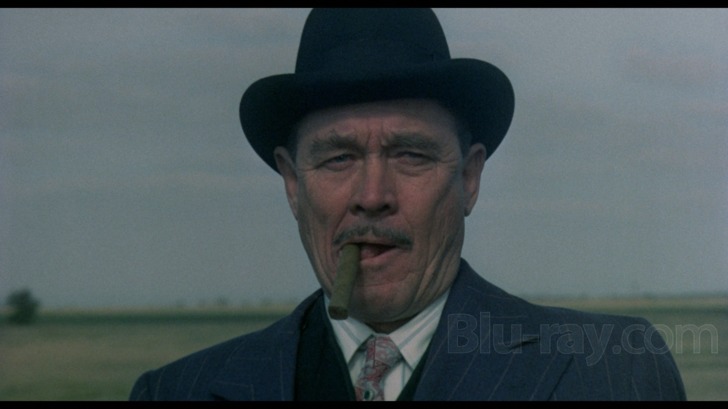
Dillinger's LPCM mono track is surprisingly boisterous, with only the hint of boxiness occasionally intruding in effects like rapid gunfire. The film's score was done by Barry De Vorzon, then just coming off of an Academy Award nomination for Bless the Beasts & Children, who populates the film with source cues and some frankly Charles Strouse-esque ebullience (was there a Dillinger song folio?). Fidelity is fine, if a bit shallow sounding at times, and there is no damage of any kind to report.
Dillinger Blu-ray Movie, Special Features and Extras 
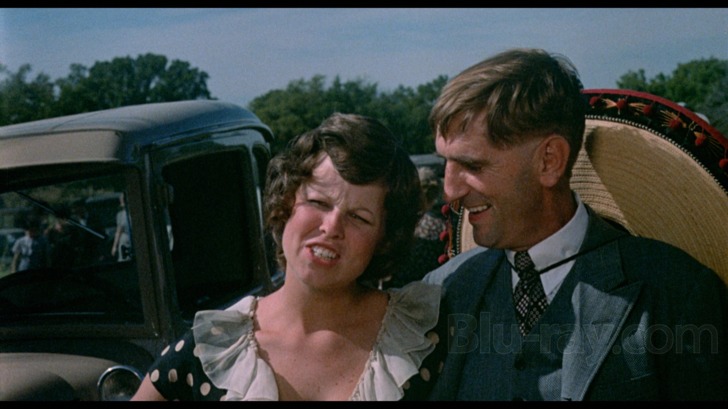
- Commentary by Stephen Prince
- Shooting Dillinger with Jules Brenner (1080p; 12:01) is a fun interview with the film's perhaps unlikely cinematographer.
- Lawrence Gordon: Original Gangster (1080p; 10:08) is another great interview with a former American International executive.
- Ballads and Bullets with Barry De Vorzon (1080p; 12:00) focuses on the film's composer.
- Gallery (1080p)
- Theatrical Trailer (1080p; 2:23)
- Music and Effects Track is presented in LPCM Mono.
Dillinger Blu-ray Movie, Overall Score and Recommendation 
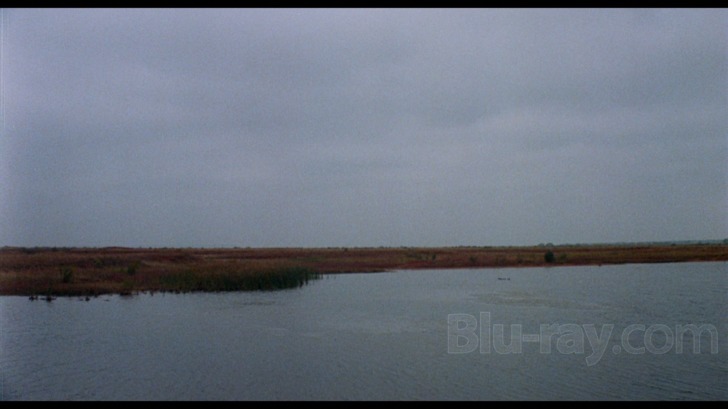
Dillinger may not have caught the zeitgeist in quite the same way Arthur Penn's Bonnie and Clyde did, but admittedly the zeitgeist wasn't quite what it had been in 1967 by the time Dillinger saw the light of day. The film has a really interesting ambience, one which more than capably recreates the hardscrabble era in which it takes place, but armchair historians will probably want to quibble with how fast and loose Milius plays with the facts. Video has been restored but still faces some intermittent issues, audio is fine, and the supplementary package very enjoyable. Recommended.
Similar titles
Similar titles you might also like

Prime Cut
4K Restoration
1972

Cold Sweat
De la part des copains
1970

Assault on Precinct 13
Collector's Edition
1976

Black Mass
2015

Gotti
2018

Hoffa
Filmmakers Signature Series
1992

Elite Squad: The Enemy Within
Tropa de Elite 2: O Inimigo Agora É Outro
2010

Eight Hours of Terror
8時間の恐怖 / Hachijikan no kyôfu
1957

The Violent Professionals
Milano trema: la polizia vuole giustizia
1973

8 Million Ways to Die
1986

The Mechanic
1972

The Connection
La French
2014

Rabid Dogs
Enragés
2015

Battle Creek Brawl
殺手壕 / Sha shou hao
1980

Capone
2020

Ash Is Purest White
江湖儿女
2018

Lucky Luciano
1973

The Mack
The Mack and His Pack
1973

Slaughter
Kill Julian Drake
1972

Busting
Limited Edition Reissue
1974
